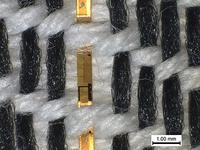-
East Asia tensions on the rise as China plans more unilateral moves
The Obama administration has advised American commercial airlines to comply with China’s demand to be notified in advance of all aircraft passing through China’s newly – and unilaterally — defined Air Defense Identification Zone(ADIZ). In contrast, Japan’s government has notified its commercial airlines to proceed with business as usual. Regional tensions are on the rise as China has said it expects to set up other ADIZs within the region.
-
-
Solar-powered, fabric-woven battery for “wearable electronics”

Though some people already seem inseparable from their smartphones, even more convenient, wearable, solar-powered electronics could be on the way soon, woven into clothing fibers or incorporated into watchbands. This novel battery development could usher in a new era of “wearable electronics.”
-
-
Smart software fighting fire with #fire
Australia’s key disaster management agencies have joined forces to tackle the problem of how to access and interpret information gathered during bushfires and other natural disasters to help emergency services save lives and property.
-
-
U.S., Japan reject China’s unilateral East China Sea claims
The Chinese government this past weekend has declared the country’s Air Defense Identification Zone (ADIZ), effective immediately. The zone covers an area in the East China Sea — two-thirds the size of the United Kingdom – which includes islands claimed by both China and Japan. China calls them the Diaoyou islands, while Japan calls them the Senkaku islands. The United States and Japan said they would not abide by China’s unilateral decision, and on Tuesday the United States sent two B-52s long-range bombers to conduct “routine training mission” through the airspace China declared as its own, and did so without following China’s instructions about how aircraft should conduct themselves in that space.
-
-
Navy “mine-hunter” AUV sets mission-endurance record
The U.S. Naval Research Laboratory’s (NRL) Acoustics Division, with Bluefin Robotics, executed a record setting 507 kilometer (315 mile), long-endurance autonomy research mission using its heavyweight-class mine countermeasures autonomous underwater vehicle (AUV), Reliant. NRL’s Reliant AUV, when equipped with a low frequency broadband (LFBB) sonar system, is perhaps best known as the prototype for the new U.S. Navy Knifefish mine-hunter.
-
-
New catalyst for cleanup of nitrites
Nitrites and their more abundant cousins, nitrates, are inorganic compounds that are often found in both groundwater and surface water — a big problem, particularly for agricultural communities. The compounds are a health hazard, and the EPA places strict limits on the amount of nitrates and nitrites in drinking water. While it is possible to remove nitrates and nitrites from water with filters and resins, the process can be prohibitively expensive. Chemical engineers at Rice University have found a new catalyst that can rapidly break down nitrites.
-
-
Bottle scanning tech to enhance airport security, benefit passengers
Los Alamos scientists have advanced a Magnetic Resonance Imaging (MRI) technology that may provide a breakthrough for screening liquids at airport security. They have added low-power X-ray data to the mix, and as a result have unlocked a new detection technology. Funded in part by the DHS’s Science and Technology Directorate (S&T), the new system is named MagRay.
-
-
Uranium, plutonium, heavy water … why Iran’s nuclear deal matters
The agreement reached with Iran will limit enrichment to 5 percent U-235 and allow International Atomic Energy Agency (IAEA) inspectors regular visits (even daily) to their facilities. The inspectors can easily determine the ratios of U-235 and Pu-239 in the input fuel and waste streams via the characteristic radiation signatures of the isotopes involved. These stand out like a sore thumb to their instruments. In addition, the IAEA will measure the amount of U-235 employed at each facility to determine if any of the uranium is diverted to undisclosed locations. While this arrangement is operating it is highly unlikely that Iran will be able to build nuclear weapons.
-
-
Exploring “culture of surveillance” in the United States
Recent revelations that the National Security Agency (NSA) has been analyzing the communication records of all U.S. citizens have many talking about the topic of “mass surveillance” by the government. A University of Kansas sociologist who has been documenting what he calls our “culture of surveillance” for nearly twenty years argues, however, that these developments are part of deeper social and cultural changes going on for quite some time. Professor William Staples focuses his attention on the relatively mundane techniques of keeping a close watch of people — what he has dubbed the “Tiny Brothers” — which are increasingly present in the workplace, school, home, and community.
-
-
The interim agreement between the P5+1 and Iran: the details
The P5+1 countries (the United States, United Kingdom, Germany, France, Russia, and China, facilitated by the European Union) have been engaged in negotiations with Iran in an effort to reach a verifiable diplomatic resolution which would prevent Iran from obtaining a nuclear weapon. On Sunday, the P5+1 and Iran reached a set of initial understandings which halts, at least temporarily, the progress of Iran’s nuclear program and rolls it back in key respects. In return, for Iran’s concessions, and as part of this initial step, the P5+1 will provide what the agreement describes as “limited, temporary, targeted, and reversible” relief to Iran.
-
-
Off-shore barges considered for destroying Syria’s chemical weapons
After failing to find a country willing to allow its territory to be used for disposing of Syria’s chemical weapons, the United States is exploring other options. Two options being seriously considered involve the destruction of Syria’s chemical weapons off shore, rather than on land. Both proposals call for removing the chemical weapons from Syria and placing them on a large barge at sea, where they would be dissolved or incinerated.
-
-
Rapid detection of superbugs
Scientists developed an array that could test for 116 antibiotic resistant genes from one class of bacteria, and 90 resistant genes from the other class of bacteria. This new lab test detects antibiotic resistance genes quickly, helping doctors choose the right drugs to knock out superbugs.
-
-
Sahel-Sahara countries to build joint security training center in Rabat
At a meeting on common security challenges in north and west Africa, government officials from nineteen Sahel, Sahara, and Maghreb countries agreed to build a joint security training center in Rabat, Morocco, to increase the competency of the region’s security forces to deal with growing terrorist and jihadist threats. The nineteen countries will also increase information sharing and harmonize the legal means they use to fight security threats. The ministers said that one of the first steps toward improving security in west and north Africa would be to improve monitoring of border and increase border security.
-
-
U.S. to intensify campaign against brutal Lord’s Resistance Army (LRA)

U.S. Special Forces continue to act on their commitment to capture Joseph Kony, leader of the Lord’s Resistance Army(LRA), a band of brutal rebels who have been kidnapping and killing villagers across central Africa for some years now. For the last two years, American military advisers have been assisting troops in four African nations — Uganda, South Sudan, Congo, and Central African Republic – in their war against the elusive LRA. Recently, the Pentagon has asked the White House for permission to expand the mission by using the Air Force’s CV-22 Osprey aircraft in Uganda, allowing troops to advance the assault on Kony.
-
-
Destroying Syria's chemical weapons in the midst of war
Close to 1,400 tons of chemical weapons are stored at twenty-three locations scattered throughout Syria. To destroy this stockpile, officials will need multiple strategies. The most dangerous are the munitions filled with “live” chemical agents, such as mustard gas, sarin, and VX. Dealing with these weapons will require bringing specialized equipment into the war-torn country.
-
More headlines
The long view
Factories First: Winning the Drone War Before It Starts
Wars are won by factories before they are won on the battlefield,Martin C. Feldmann writes, noting that the United States lacks the manufacturing depth for the coming drone age. Rectifying this situation “will take far more than procurement tweaks,” Feldmann writes. “It demands a national-level, wartime-scale industrial mobilization.”
How Male Grievance Fuels Radicalization and Extremist Violence
Social extremism is evolving in reach and form. While traditional racial supremacy ideologies remain, contemporary movements are now often fueled by something more personal and emotionally resonant: male grievance.
The Surprising Reasons Floods and Other Disasters Are Deadlier at Night
It’s not just that it’s dark and people are asleep. Urban sprawl, confirmation bias, and other factors can play a role.
Why Flash Flood Warnings Will Continue to Go Unheeded
Experts say local education and community support are key to conveying risk.
